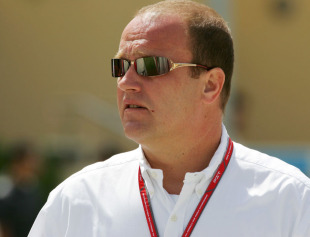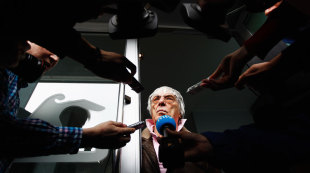- GP Week
What does the Gribkowsky affair mean for F1?

While there is currently no suggestion that Bernie Ecclestone will be issued with any charges by the German prosecutors, rumours of the F1 supremo's possible arrest are bad for business. Those unacquainted with the vagaries of German law presume that Gribkowsky's conviction will mean charges for Ecclestone. However, the fact that one man has been found guilty of receiving bribes does not mean that the other will be found guilty of bribery.
While Gribkowsky went on court record to say that the charges against him were "essentially true", and admitted receiving bribes from Bernie Ecclestone, the German banker was defending himself against a number of corruption charges, and witness statements from the F1 boss claiming blackmail and extortion.
Or, as Bernie put it, "a sophisticated shakedown".
When fighting to save one's skin in the courtroom, all manner of bargains must be made, both privately and publicly. Is it better to attempt to clear one's name - or some of it - in a long and expensive legal battle, or admit to the charges with a view to securing the shortest possible custodial sentence? Far better to go down for receiving bribes than to fight the charges and risk being found guilty of extortion.
At least, that's the argument Ecclestone used when informed of Gribkowsky's confession, telling the Daily Telegraph: "The poor guy has been banged up for 18 months. He would have said anything to save himself. He was going to be locked up whatever happens."
Bernie Ecclestone has appeared in the German courts, but only as a witness. The Munich prosecutors have investigated the Briton, but not served him with any charges. And while it is possible that Ecclestone could be charged in future, it is highly unlikely that he will face criminal charges in Germany. The investigation into Gribkowsky has been long-running, and if the prosecutors had been able to build a viable case against Ecclestone they would have done so already.
Which isn't to say that the outcome of the Gribkowsky trial sees Ecclestone free from any suspicion of wrong-doing. During his closing statement, German prosecutor Christoph Rodler asserted that "Ecclestone was not a victim of blackmail, but a fellow participant in bribery." The remark has been interpreted as many by the German authorities' desire to pursue the F1 boss for his part in the Gribkowsky affair, could equally be classed as a passionate statement made by a prosecutor unafraid of using dramatic rhetoric to convince.
Irrespective of whether or not Bernie Ecclestone is charged with any offences in Germany, the F1 boss has seen his personal affairs come under close examination by the British authorities. What was inevitable - especially given the recent British media focus on tax avoidance - was an intensive investigation by HMRC of the Ecclestone family tax affairs. Because if the tax officers can find proof that Bernie has influence over the Bambino Trust, they will be in a position to claim unpaid taxes that make Jimmy Carr's financial affairs look like peanuts.
Ecclestone says he expected as much, telling Reuters: "After all this, I'd have been surprised if they didn't contact me." But HMRC's investigation was not triggered by this week's conviction in Munich - reports in the British media dating from February show an investigation has been underway for several months. That month, an unnamed HMRC representative was widely quoted as saying that "HMRC has put a team of investigators on Bernie Ecclestone to look into his involvement in the trust and exactly how much he has to do with it. They are now in the process of making enquiries and researching every minor detail as they look to build a case."

Bernie has been through all this before - HMRC last investigated the Bambino Trust in 2008, and found that he did not control it. "I received a letter from HMRC in 2008 that [said] everything was OK in relation to the trust," Ecclestone has been quoted as saying. "It would be silly [for HMRC] to check again when they have already said that everything was in good order."
HMRC are not the only British public body now interested in Ecclestone's affairs. Following the 81-year-old's appearance as a witness at the trial last November, a Serious Fraud Office spokesman was quoted as saying: "The SFO is aware of the allegations against Mr Ecclestone and is liaising with the authorities in Germany to ascertain if there is a case to answer in the UK" There has been little information made public concerning the SFO's investigations, and it is unclear whether they are still ongoing.
Whatever happens with the Serious Fraud Office, the outcome of the Gribkowsky affair might have a far more immediate and personal impact on Bernie. Irrespective of what HMRC may or may not find over the course of what is certain to be a multi-year investigation, CVC Capital Partners could argue that the attention on Ecclestone's personal affairs is harming their Formula One investment. Should that be the case, the private equity firm will almost certainly orchestrate his removal.
CVC have spent the past few months reducing their stake in the Formula One business in anticipation of the court's verdict. Recent sales to Waddell & Reed, BlackRock, and Norway's Norges Bank Investment Management have seen CVC's stake drop from 63 percent to 35% in two separate deals - one worth $1.6 billion, and one worth $500 million. While these are not fire-sale prices, there is a very real sense that CVC are working their way through an exit plan designed to make the greatest possible return on their F1 investment at a time of uncertainty caused by the possibility of charges for Ecclestone and the on-going Concorde Agreement negotiations, both of which could lead to financial disaster should the worst happen.
There are certain advantages to the fact that the most likely consequences for the sport - if any - will be reputational. Given that Bernie Ecclestone is in his eighties, Formula One's biggest stakeholders have been aware of the need for a succession plan for when the Englishman has had enough of running the sport. Should the whisper of scandal from Munich threaten to tarnish F1's image - and its pocketbook - Ecclestone can retire without losing face.
Looking beyond Ecclestone, there have been rumours that the effects of a possible corruption scandal could drive Mercedes out of the sport. But whatever statements some members of the Daimler board might make to the press, it is unlikely that events in Munich will lead to the retreat of the Silver Arrows. There have long been anti-motorsport dissenters in Stuttgart, and they take advantage of every opportunity to generate exit talk. This is one such occasion, irrespective of what the company statutes - standard boilerplate at many multinationals - might state.
The biggest concerns are financial, and have the potential to affect every team on the grid. While the sport itself can survive seemingly any scandal, bluechip sponsors have corporate images and brand identities to preserve, and as a result cannot be relied upon to stick around in times of trial and tribulation.The current financial climate is fraught with difficulty, and losing a major sponsorcould be crippling, even for one of the richer teams at the head of the pack. Should a number of sponsors decide that they can no longer risk association with Formula One as a brand, the impact on the teams' budgets - and ability to compete - could be devastating.
Formula One is resilient, thanks in no small part to its large and passionate fan base. But it is also heavily dependent on public investment, thanks to the governments who pay the sport's hefty hosting fees. As a consequence, a worst-case scenario outcome of an F1 corruption scandal could see race contracts cancelled as governments kow-tow to public opinion. Until it becomes clear whether or not Bernie Ecclestone will face any criminal charges, the world of Formula One will be on a knife-edge, debating the likelihood of best- and worst-case scenarios.
This story isn't over yet.

